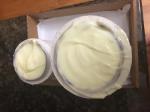Food Grade vs Tech Sodium-Hydroxide
by Cuqui
Recently I purchased Sodium-Hydroxide-Lye-Tech-Grade.
It was cheaper than the food grade, although it states that both can be used for soap making I notice a difference in the outcome of my soaps.
I don’t know what is causing the difference. My soaps lack fragrance that I add and the smell is horrible when I try to make goat or coconut milk soap.
Can you tell me if there is a difference in calculations when using the tech grade vs. food grade?
I purchased them from Essential Depot. Previously I used Rooto® Crystals of Household Lye purchased @ ACE Hardware.
Answer:
Hi Cuqui...I've moved your question from "Making Mango Butter" to it's own place.
I've never heard of having to use different calculations when using tech grade lye but then again I've only ever used food grade.
Soap makers tend to buy the food grade for the most part and I feel it to be better. My thoughts are that tech grade probably contains impurities that could have adverse effects in the soap making process...not sure about this of course...I'm simply guessing.
Good luck,
Cathy
Comments for Food Grade vs Tech Sodium-Hydroxide
|
||
|
||
|
||
|
||
|
||
|
||
|
||
|
||
|
||
|
||

